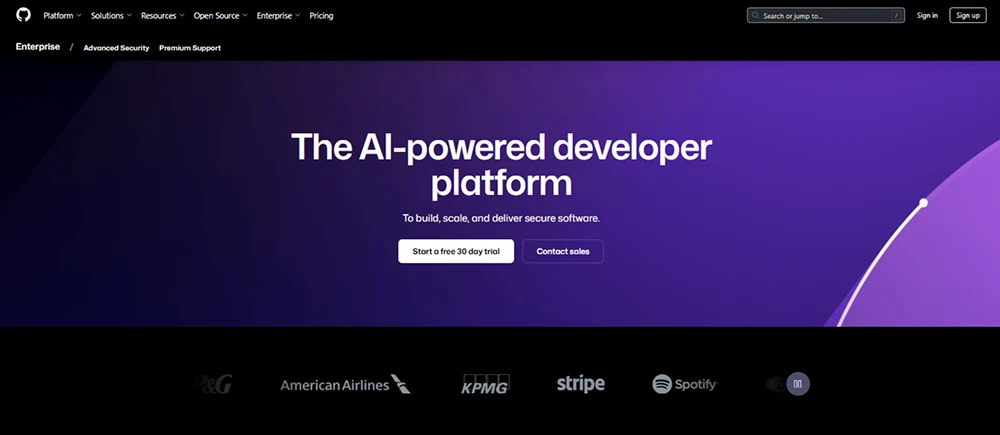GitHub(Enterprise) Overview & 2026 Industry Position
GitHub(Enterprise) has become the backbone of secure, collaborative, and scalable software development for large organizations across sectors. As of 2026, it is not merely a source code management platform but a robust ecosystem integrating DevSecOps best practices, AI-assisted coding, enterprise-grade compliance, and global-scale collaboration tools. In a crowded DevOps market, GitHub(Enterprise) anchors itself through deep market penetration, thanks to its Git foundation, full-stack CI/CD pipelines, advanced auditing, and the transformative power of AI via GitHub Copilot Enterprise.
From Launch to 2026: GitHub(Enterprise)’s Journey
Initially launched in 2008 as GitHub—a community-driven hub for open-source projects—the platform quickly scaled to support private repositories and enterprise needs by 2011. Key milestones include:
- 2012: Introduction of GitHub(Enterprise) for on-premise hosting
- 2018: Acquired by Microsoft, signaling deep integrations across the Azure and Microsoft 365 ecosystems
- 2020: Launch of GitHub Actions, revolutionizing CI/CD
- 2021: Rollout of GitHub Copilot (beta for developers)
- 2023: GPT-4 based Copilot for Business emerges
- 2025: Copilot Enterprise launched with custom model training and compliance-aware completion
GitHub(Enterprise)’s 2026 strategy centers around AI-first DevOps that blends human creativity with machine acceleration, without compromising governance, privacy, or scale.

GitHub(Enterprise) Key Features
GitHub(Enterprise) combines development velocity with governance and enterprise readiness. Its current feature set includes:
- GitHub Copilot Enterprise: AI-assisted pair programming with private repo context inclusion
- Advanced Security: Automatic secret scanning, dependency reviews, and code scanning powered by CodeQL
- GitHub Actions: Integrated CI/CD enabling dev, test, and deployment workflows with customizable runners and matrix builds
- Enterprise Insights: Org-wide analytics, contributor metrics, and DORA reports
- CodeSpaces: Browser-based development environments preloaded with dependencies at scale
- AI Governance Tools: Track LLM completions, audit hallucinations, and control training data policies (2025 update)
Workflow & UX
GitHub(Enterprise) offers a refined user experience both for developers and enterprise administrators. Developers benefit from consistent UI across desktop and browser, while IT and security professionals can manage access, set permissions, and enforce code hygiene with precision. Key elements include:
- Single sign-on with SCIM provisioning and role-based access control
- Unified GitHub Mobile app with push approval and dev insights
- Monorepo-compatible navigation and real-time review suggestions
- Intelligent code suggestions directly inside pull requests
GitHub(Enterprise) Pricing Analysis & Value Metrics
As of July 2026, GitHub(Enterprise) offers competitive per-seat and consumption-tiered plans:
| Plan | Monthly Cost (per user) | Key Inclusions |
|---|---|---|
| GitHub Team | $4/user | CI/CD, collaboration tools, 2,000 CI minutes/mo |
| GitHub Enterprise | $21/user | Copilot Enterprise, SAML SSO, no CI limit |
| Annual SSO Compliance Bundle | Custom Quote | On-prem + Cloud hybrid hosting, advanced audit logs, dedicated support |
Value Assessment: GitHub(Enterprise) scales well from medium teams to global enterprises, and its Copilot output ROI alone frequently offsets user seat costs when deployed organization-wide.
Competitive Landscape
GitHub(Enterprise) faces competition from other robust DevOps solutions. Here’s a quick comparison:
| Platform | Strengths | Ideal Audience |
|---|---|---|
| GitLab Ultimate | End-to-end DevSecOps; open-core model | Security-heavy teams |
| Bitbucket Cloud | Tight JIRA integration; pipelines for CI | Atlassian-centric orgs |
| Azure DevOps | Native Microsoft support; enterprise policy configs | Hybrid enterprises on Azure |
| GitHub(Enterprise) | AI copilots, vibrant ecosystem, universal Git support | All DevOps-forward orgs |
GitHub(Enterprise) Use Cases
GitHub(Enterprise) shines in scenarios requiring:
- Cross-continent digital product teams with strict change management
- Banking and fintech sectors needing SOX/GDPR auditing support
- AI-native companies that continuously retrain models based on repo data
- Compliance-driven healthcare or defense coding pipelines (e.g., FedRAMP/GxP)
- Education and research institutions focused on AI/ML collaboration
Smart Integrations & Ecosystem Reach
GitHub(Enterprise) supports thousands of direct integrations, making it a nucleus of enterprise DevOps environments:
- SSO/SCIM: Okta, Azure AD, Google Workspace
- CI/CD Extensions: Jenkins, Terraform Cloud, CircleCI, ArgoCD
- Security: Snyk, Datadog, SentinelOne
- Issue Tracking: JIRA, Linear, Clubhouse
- Code Quality: SonarQube, Codacy
Deep ecosystem reach enables seamless API usage, webhooks, and the GitHub Marketplace for scalable automation.
Balanced Pros & Cons
- Pros:
- Best-in-class developer experience
- Language-agnostic and universally Git-native
- AI-assisted coding raises productivity and reduces bugs
- Highly secure with constant compliance enhancements
- Cons:
- Learning curve for GitHub Actions power-users
- Copilot licensing may require legal review in strict compliance orgs
- Costs can add up in very large orgs with tiered billing
Pro Tip: Use Copilot’s policy engine to limit AI suggestions by repo, language, or developer group—maximizing productivity while safeguarding compliance.
Final Thoughts
GitHub(Enterprise) is purpose-built for organizations looking to scale innovation securely. With AI coding assistance, hardened access control, and CI/CD flexibility, it supports everything from scrappy startups aspiring toward unicorn status to heavily regulated enterprises managing thousands of contributors. It’s not just a code host; it’s the future-proof backbone of intelligent software delivery.
GitHub(Enterprise) FAQ
It is used for secure source code collaboration, CI/CD automation, AI-powered development, and governance across enterprise development life cycles.
GitHub(Enterprise) includes SAML SSO, advanced security scanning, Copilot Enterprise, and compliance tools not present in Free or Pro plans.
Yes. Copilot Enterprise respects enterprise data boundaries and avoids training on user content by default. Admins can also configure visibility settings granularity.
Yes. GitHub offers GitHub Enterprise Server, a fully private and air-gapped version for confidential deployments.
Enterprise support includes 24/7 SLA-based ticketing, technical account management (TAM), and onboarding services, with direct GitHub and Microsoft ecosystem liaison support.


